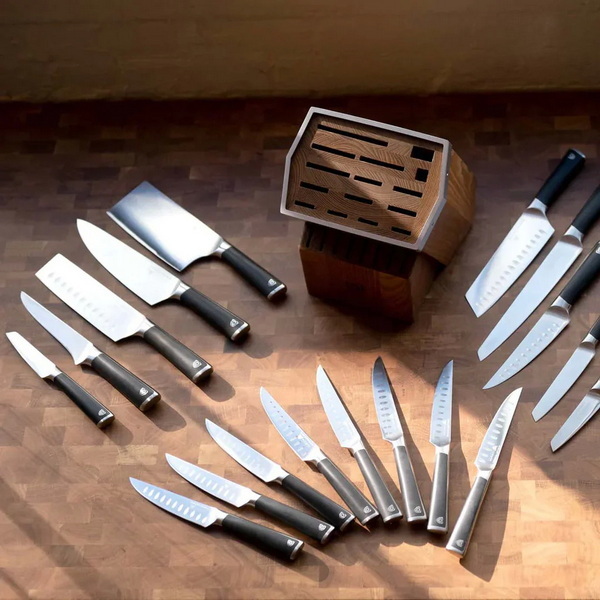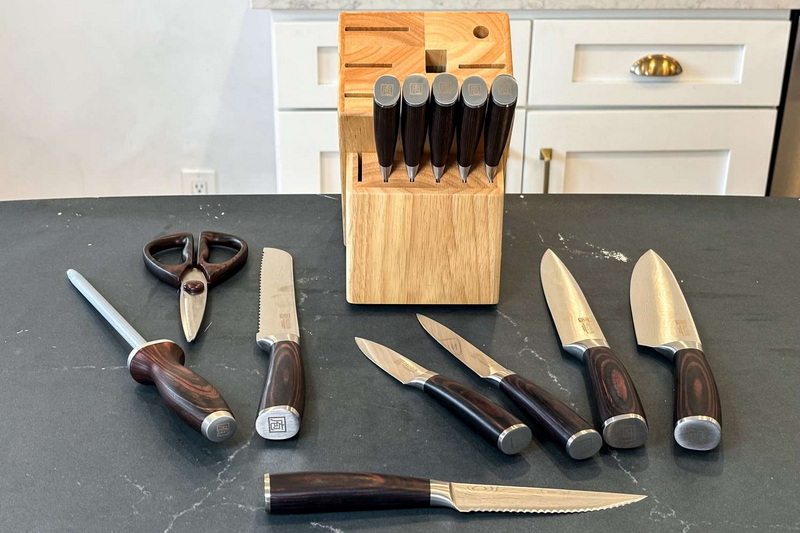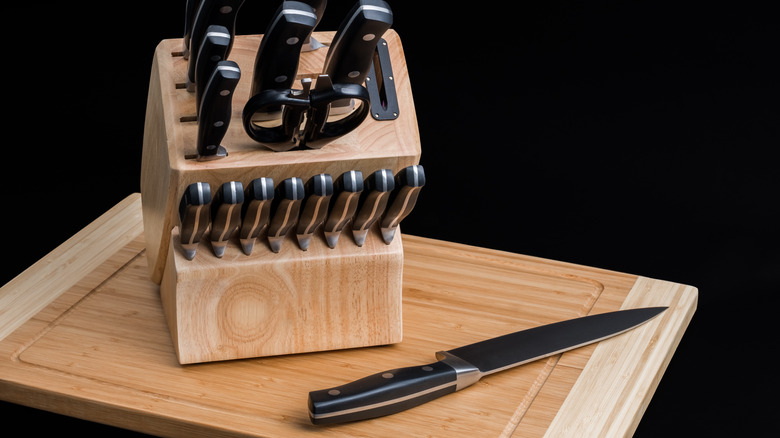

Views: 222 Author: Ella Publish Time: 2025-05-31 Origin: Site








Content Menu
● The Legacy of Japanese Knife Making
● What Makes Japanese Knife Blocks Special?
● Top Knife Block Manufacturers in Japan
● Innovative Designs in Japanese Knife Blocks
● Caring for Your Japanese Knife Block and Knives
● Visual and Video Insights into Japanese Knife Block Manufacturing
● The Global Appeal of Japanese Knife Blocks
● Frequently Asked Questions (FAQ)
>> 1. What types of materials are used in Japanese knife blocks?
>> 2. How do magnetic knife blocks benefit Japanese knives?
>> 3. Are Japanese knife blocks suitable for all knife sizes?
>> 4. How should I maintain my Japanese knife block?
>> 5. Can I visit Japanese knife block manufacturers to see their craftsmanship?
Japan is renowned worldwide for its exceptional craftsmanship in knife making, a tradition deeply rooted in centuries of blade forging history. Among the many Japanese culinary tools, knife blocks hold a special place as both practical kitchen accessories and showcases of exquisite artistry. This article explores the top knife block manufacturers in Japan, their unique features, and why their products are treasured by chefs and cooking enthusiasts globally.

Japanese knives are celebrated for their sharpness, precision, and durability. The country's knife-making heritage dates back to the samurai era, where swordsmiths honed their skills to create blades that were not only functional but also works of art. Modern Japanese knife manufacturers continue this legacy by blending traditional techniques with contemporary innovations, resulting in kitchen knives and knife blocks that embody both beauty and utility.
The art of Japanese knife making is not just about the blade itself but also about the entire experience of handling and storing these knives. Knife blocks, therefore, are designed to complement this experience by offering protection, accessibility, and a visual harmony with the knives they hold.
Japanese knife blocks are designed to complement the high-quality knives they hold. Unlike generic knife holders, these blocks often feature natural wood materials, magnetic strips, or innovative designs that protect the knives' edges and ensure safe storage. They are crafted to maintain the knives' sharpness and provide easy access, making them essential for any kitchen that values precision and elegance.
The design philosophy behind Japanese knife blocks often emphasizes simplicity, minimalism, and functionality. This approach reflects the broader Japanese aesthetic principles of wabi-sabi—the appreciation of beauty in imperfection and transience. As a result, many knife blocks showcase the natural grain and texture of the wood, creating a warm and inviting kitchen atmosphere.
Shizu Hamono is a distinguished manufacturer known for its stylish magnetic natural wood knife blocks. Made from high-quality natural woods such as walnut and German beech, these blocks combine functionality with aesthetic appeal. The strong magnets inside securely hold knives of various sizes, keeping blades sharp and sanitary. Each block is crafted in Japan, reflecting the country's dedication to quality and design.
Features:
- Natural wood construction with organic textures
- Magnetic holding system for versatile knife placement
- Compact size suitable for most kitchen countertops
- Crafted with precision in Seki, Japan
Shizu Hamono's magnetic blocks are particularly popular among chefs who appreciate the ease of accessing their knives quickly without the risk of dulling the blade edges. The magnetic system also allows for flexible knife arrangement, accommodating different knife shapes and sizes.
Senken Knives offers complete Japanese knife block sets featuring natural hardwood acacia blocks. Their knife sets are meticulously finished and designed to meet the needs of both professional chefs and home cooks. Senken's blocks are known for their smooth finish and durability, providing a stable and attractive home for a variety of Japanese knives.
Highlights:
- Hardwood acacia knife blocks
- Wide range of knife sets with blocks, from 11 to 16 pieces
- Emphasis on craftsmanship and durability
- Suitable for various kitchen styles
Senken's approach balances traditional woodworking techniques with modern design sensibilities. Their blocks not only protect knives but also serve as elegant kitchen centerpieces, blending seamlessly with contemporary and classic kitchen decors alike.
Based in Osaka and Tokyo, Tower Knives specializes in Japanese knives and knife blocks crafted by skilled artisans. Their blocks are designed to showcase the beauty of Japanese cutlery while offering practical storage solutions. Tower Knives prides itself on quality and craftsmanship, making it a trusted name among knife enthusiasts.
Key Points:
- Artisan-crafted knife blocks
- Specialty store with expert advice
- Focus on traditional Japanese knife-making techniques
- Available in major Japanese cities
Tower Knives often collaborates with master craftsmen to produce limited-edition knife blocks that highlight unique woods and finishes. Their products appeal to collectors and professional chefs who seek both functionality and exclusivity.
Cuisine::pro® offers premium Japanese steel knife blocks that cater to chefs who demand precision and quality. Their collections include limited-edition knife blocks paired with high-performance knives made from Japanese Damascus steel. These blocks are designed for durability and elegance, perfect for elevating any kitchen environment.
Notable Features:
- High-quality Japanese steel knife blocks
- Collections include 7 to 10-piece sets
- Designed for precision cutting and longevity
- Stylish and functional designs
Cuisine::pro®'s knife blocks often feature sleek, modern designs that appeal to chefs who prefer a contemporary kitchen aesthetic. Their use of premium materials ensures that the blocks not only look impressive but also stand the test of time.
Japanese knife blocks often use natural hardwoods prized for their durability and beauty. Walnut, beech, and acacia are common choices, each providing a unique grain and finish that enhances the kitchen's aesthetic. Magnetic blocks are increasingly popular for their sanitary benefits and ease of use, allowing knives to be stored without dulling the blades.
The manufacturing process balances traditional woodworking skills with modern technology to ensure each block meets high standards of quality and safety. This attention to detail reflects the broader Japanese philosophy of craftsmanship, where every product is made with care and precision.
In addition to wood, some manufacturers incorporate other materials such as bamboo, resin, or metal accents to add durability and style. Bamboo, in particular, is valued for its sustainability and resistance to moisture, making it an excellent choice for kitchen environments.

Innovation is a hallmark of Japanese craftsmanship, and knife block manufacturers continue to push the boundaries of design and functionality. Some manufacturers have introduced modular knife blocks that can be customized according to the user's knife collection. These blocks allow for reconfiguration of slots and magnetic areas, adapting to changing kitchen needs.
Others have developed wall-mounted magnetic knife racks, which free up counter space while providing a striking display for knives. These racks often feature minimalist designs that emphasize the beauty of the knives themselves, turning the kitchen into a gallery of culinary art.
Moreover, some knife blocks integrate smart technology, such as built-in knife sharpeners or humidity control systems to maintain the ideal environment for wooden blocks and steel blades. These innovations ensure that Japanese knife blocks remain relevant and highly functional in modern kitchens.
Proper maintenance extends the life of both knives and their blocks. Japanese knives require careful cleaning and sharpening, and blocks should be kept dry and clean to prevent damage. Magnetic blocks need occasional checks to ensure magnets remain strong and free from debris. Storing knives correctly in the block protects their edges and promotes kitchen safety.
To maintain wooden blocks, it is recommended to regularly oil the surface with food-safe mineral oil or beeswax to prevent drying and cracking. Avoid soaking wooden blocks in water or placing them in dishwashers, as excessive moisture can warp the wood.
For magnetic blocks, wiping the surface with a damp cloth and drying thoroughly helps maintain a clean and hygienic storage environment. Ensuring knives are completely dry before placing them in the block prevents rust and corrosion.
To truly appreciate the artistry behind Japanese knife blocks, many manufacturers offer factory tours or online videos showcasing their production processes. For example, some renowned factories provide a behind-the-scenes look at how knives and blocks are crafted, combining hand forging with precision machinery. These visuals highlight the dedication and skill involved in creating each product.
Similarly, videos of craftsmen demonstrate the traditional hammering and shaping techniques used in knife making, which complement the design of the blocks that house these blades. Watching these artisans at work reveals the meticulous attention to detail and passion that define Japanese blade and block manufacturing.
These multimedia insights are invaluable for enthusiasts who wish to understand the full story behind their kitchen tools, deepening their appreciation for the heritage and craftsmanship embodied in every knife block.
Japanese knife blocks have gained immense popularity worldwide, not only among professional chefs but also among home cooks who seek quality and elegance in their kitchen tools. The combination of superior materials, expert craftsmanship, and innovative design makes these blocks a sought-after item in international markets.
Many culinary schools and restaurants outside Japan prefer Japanese knife blocks for their durability and practicality. The blocks' ability to protect expensive knives while enhancing kitchen aesthetics makes them a wise investment for anyone serious about cooking.
Furthermore, Japanese knife blocks often serve as thoughtful gifts for cooking enthusiasts, symbolizing respect for culinary tradition and appreciation for fine craftsmanship.
Japanese knife blocks are more than simple kitchen accessories; they are the culmination of centuries of craftsmanship, innovation, and design excellence. Manufacturers like Shizu Hamono, Senken Knives, Tower Knives, and Cuisine::pro® lead the industry by producing blocks that protect and showcase some of the world's finest knives. Whether you are a professional chef or a culinary enthusiast, investing in a top-quality Japanese knife block enhances your kitchen's functionality and aesthetic appeal.
By choosing a knife block from one of these top manufacturers, you ensure your knives remain sharp, safe, and beautifully displayed, making your cooking experience more enjoyable and efficient. The blend of traditional artistry and modern innovation found in Japanese knife blocks truly sets them apart as indispensable tools for any kitchen.

Japanese knife blocks commonly use natural hardwoods such as walnut, beech, and acacia. Some blocks incorporate strong magnets to hold knives securely without dulling the blades. Bamboo and resin are also used for their durability and moisture resistance.
Magnetic knife blocks keep knives suspended, preventing contact with hard surfaces that can dull edges. They also promote better hygiene by allowing air circulation around the blades and provide flexible knife arrangement options.
Many Japanese knife blocks are designed to accommodate various knife sizes, especially those with magnetic systems. Traditional wooden blocks may have fixed slots sized for standard kitchen knives, so it's important to select a block that fits your knife collection.
Keep the block dry and clean. Avoid prolonged exposure to moisture to prevent wood warping or mold. For wooden blocks, regularly oil the surface with food-safe mineral oil or beeswax. For magnetic blocks, ensure magnets are free of debris and maintain their strength.
Some manufacturers offer factory tours or open workshops where visitors can observe the knife and block making process. These tours provide valuable insight into the craftsmanship involved and deepen appreciation for the products.